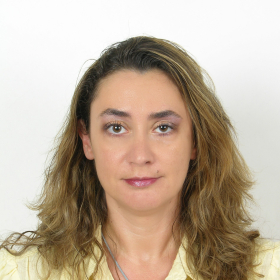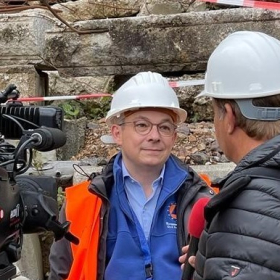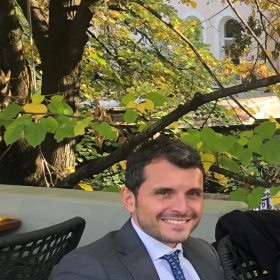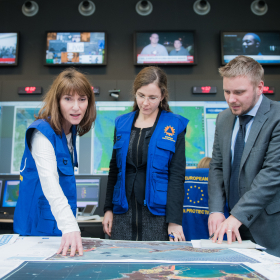

Yolanda (European Commission)
"Crisis management encompasses the response to emergencies, in Europe and around the world. Organised along the pillars of civil protection and humanitarian aid, crisis management, for DG ECHO, means tight deadlines, coordination with the other EU institutions and the Member States and with international organisations, travel, and, most of all, the sense that you are doing something that brings tangible benefits to millions. I work in communication – keeping the public informed on what the Union is doing in response to crises from the COVID-19 pandemic to the activation of the civil protection mechanism for Ukraine, to the organization of humanitarian air bridges to the strengthening of the EU’s firefighting fleet. Every day brings something different."

Felix (European Commission)
"I am a lawyer by training and have been working for the European Commission since 2005. I started my career in the legal team of DG Agriculture, then moved around inside the same DG, dealing with topics as diverse as international trade negotiations and organic farming. But after 10 very intense and interesting years, I moved to DG ECHO. I worked as an Assistant to the Director-General and later joined the Cabinet of the European Commissioner for Crisis Management. Especially these two assignments gave me a good overview of the diversity of work carried out by DG ECHO: From coordinating international emergency response in case of natural disasters in the EU to supporting humanitarian funding across the globe.
More recently, I became the Manager of a Unit of 27 colleagues that deal with the development of the Union Civil Protection Knowledge Network, a structure that will help civil protection and disaster management stakeholders to connect better and share knowledge. It also entails assisting in civil protection field exercises, organising expert trainings and many more things.
Working in DG ECHO is very special. Because it is essentially about helping people in need and preparing better for disaster. Ultimately, to save lives. I consider this a great privilege: to be part of what is probably one of the most noble policy areas of the Union. It is not about pushing paper, but delivering concrete help when it is most needed. And the COVID-19 pandemic as well as Russia’s aggression against Ukraine have shown how important it is to stand together in solidarity.
In fact, I would probably not have thought during my studies of international law at Tübingen and Bonn, London and Berne Universities that I would end up here. But I have not regretted that choice ever since.
And by the way, Brussels is also a very nice place to live and to raise a family. I cannot think of a more international and inspiring workplace. For the three children, growing up in an international environment is a huge opportunity. They grew up bilingual from the beginning and the European Schools make sure that they become enthusiastic young Europeans.
The only thing I should also point out: The weather in Belgium is not always what you would like it to be … but Belgian food and drink compensate."

Giovanni (European Commission)
"My first visit to Brussels was as a university student, when I realised that this would be a great place to work in an international context and contribute to advancing European integration.
After starting my career in the European Commission in the Directorate General for Employment and Social Affairs, I moved to Home Affairs 9 years ago.
I have worked on different files related to migration and security, including a two-year deployment in Italy dealing with the migration crisis. I have dealt with both operational and policy files. There is great diversity of tasks and files you deal with in DG HOME, so it never gets boring.
Working in Home Affairs in the European Commission gives you the opportunity to deal with subjects that are under the spotlight of politics and public opinion, directly related to the welfare and security of our societies.
I have been living in Brussels for 13 years now, it is my second home, a diverse and multicultural city, where it is easy to connect with people."

Susanne (Council of the EU)
"Being a policy officer in the field of migration fully corresponds to what has been my main subject of interest ever since I studied refugee law at university. Gaining hands-on experience from both the Danish Immigration Service and UNHCR and witnessing a real refugee crisis in 1996-97 certainly gave me an insight I have used a lot since I started in the migration team in the Council Secretariat back in 2015, right at the beginning of a refugee crisis in Europe. It is also tough to do this line of work because you deal with a policy that affects many thousands of people directly every day and there are no easy solutions."

Maria (European Commission)
"My name is Maria and I am Spanish, from Madrid. I have lived in Brussels for the last 20 years and I have to say that I have very much enjoyed it since the start. Brussels is a not so big, but it is very cosmopolitan, which suits me very well. In the streets, you overhear so many languages and see so many different types of people, which strangely makes me feel at home.
Having a background as a lawyer, I have been working in DG ECHO since 2008. DG ECHO deals with Humanitarian Aid and Civil Protection. Specifically, since 2016 I have been working in the directorate dealing with emergencies, first in the European Emergency Response Center (ERCC) and now dealing with the European Humanitarian Response Capacities (EHRC).
The ERCC helps to coordinate a coherent EU response to major natural and man-made disasters occurring inside and outside the EU: earthquakes, cyclones, floods, conflicts, etc. The Center provides a platform for coordination within the EU institutions and Member States. It also has a 24/7 duty system that coordinates with partners like the UN, international organizations, NGOs and other crises centers in the EU and the world.
Concretely, now I work as a Team Leader of the EHRC which designs, sets up, and monitors DG ECHO's directly implemented operations outside the EU, especially after emergencies.
The EHRC is a set of operational tools designed to provide rapid but temporary support to partners to fill operational gaps in the humanitarian response where the humanitarian community struggles to provide support, thus helping to cover immediate needs of the affected population.
The different instruments of the EHRC include the provision of common logistics services to humanitarian partners in the form of international and in-country transport operations (i.e., Air Bridges), warehousing capacities, prepositioning and delivery of emergency stockpiles, deployment of logistics and health experts, etc.
Unfortunately, there are too many crises in the world, but what I really like about my job is that, when disasters strike, I contribute to saving lives and bringing support and relief to vulnerable populations, partially fighting the feeling of helplessness that we all have when facing such human tragedies.
If you feel this itch and like to work in an international environment, I encourage you to join us. It is also a very dynamic environment, with many dedicated colleagues driven by a shared passion to bring European solidarity to those in need. Good and committed professionals have plenty opportunities to grow, travel, live abroad while doing a fulfilling job at the European institutions."
